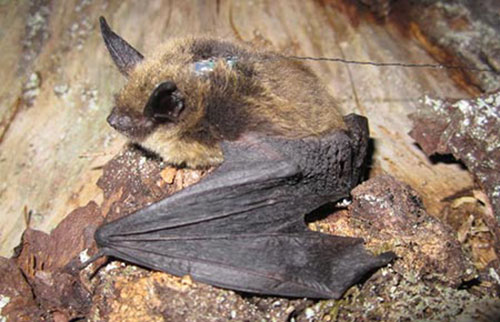
Rabies Detected in POW BatBy MARY KAUFFMAN July 21, 2014
Keen's Myotis (Myotis keenii)
There are six species of bats living in Alaska. Prior to July 2014, only two bats had been confirmed with rabies in Alaska. In 1993, a little brown bat was found crawling and squeaking on the ground near Ketchikan in the Tongass Forest. Further testing at the Centers for Disease Control and Prevention (CDC) Rabies Laboratory in Atlanta confirmed this brown bat was infected with the silver-haired bat rabies virus variant. In early July 2006, a graduate student studying bats in the northeastern part of Prince of Wales Island found a Keen’s long-eared bat that was unable to fly. The bat was euthanized and submitted to the Alaska State Virology Laboratory (ASVL) by the Alaska Department of Fish and Game (ADF&G) on August 30, 2006. On August 31, ASVL reported that the bat had tested positive for rabies - that strain was characterized as a red bat rabies virus variant. According to an Alaska State Virology Laboratory Bulletin, there have been no cases of bat variant rabies among non-bats in Alaska. Additionally, bats from other regions in Alaska, including the Kenai Peninsula and the Anchorage- Mat-Su Valley area, have all tested negative for rabies. However, any bat, regardless of location of origin, that is acting abnormally should be tested for rabies. Similarly, any animal that has bitten a human and is acting abnormally should be submitted for rabies testing. The majority of human cases of rabies in the United States in the past 15 years have been caused by bat variants of the rabies virus. Anyone who may have been bitten or scratched by a bat should contact a health care provider immediately to be evaluated for postexposure rabies prophylaxis. If the bat is still available, it should be submitted to Alaska State Virology Laboratory (ASVL) for rabies evaluation. According to an Alaska State Virology Laboratory (ASVL) Bulletin, in general, migratory patterns of bats in Alaska are not well-documented. It is reasonable to assume that rabies circulates among bat populations in southeastern Alaska, although the possibility that any of the rabies-infected bats originated from outside Alaska can not be excluded. Bats from other regions in Alaska, including the Kenai Peninsula and the Anchorage-Mat-Su Valley area, have all tested negative for rabies. Samples from this third rabid bat found last week on Prince of Wales Island will be sent to the Center for Disease Control in Alanta for rabies virus variant characterization. Ketchikan and Prince of Wales Island-based Island to Island Veterinary Clinic also listed a few things be aware of concerning pets regarding this alert that rabies was found in a dead bat on Prince of Wales Island:
"Please help to let your friends, neighbors, and fellow pet lovers know that this situation has occurred. We are especially hoping to reach pet owners on Prince of Wales to let them know this danger exists, but could easily spread to surrounding islands so this is a concern for our region in general," stated Island to Island Clinic in their FaceBook alert. What to do with sick/dead bats Bats seen on the ground or behaving abnormally should be immediately reported to the Alaska Department of Fish and Game (ADF&G). According to the Alaska Department of Fish and Game and the Alaska State Virology Laboratory, the general public should not handle bats. Persons in professions that regularly handle bats should consult their health care provider or the Section of Epidemiology for recommendations on receiving a preexposure rabies immunization series.
On the Web:
Sources of News:
|
||
